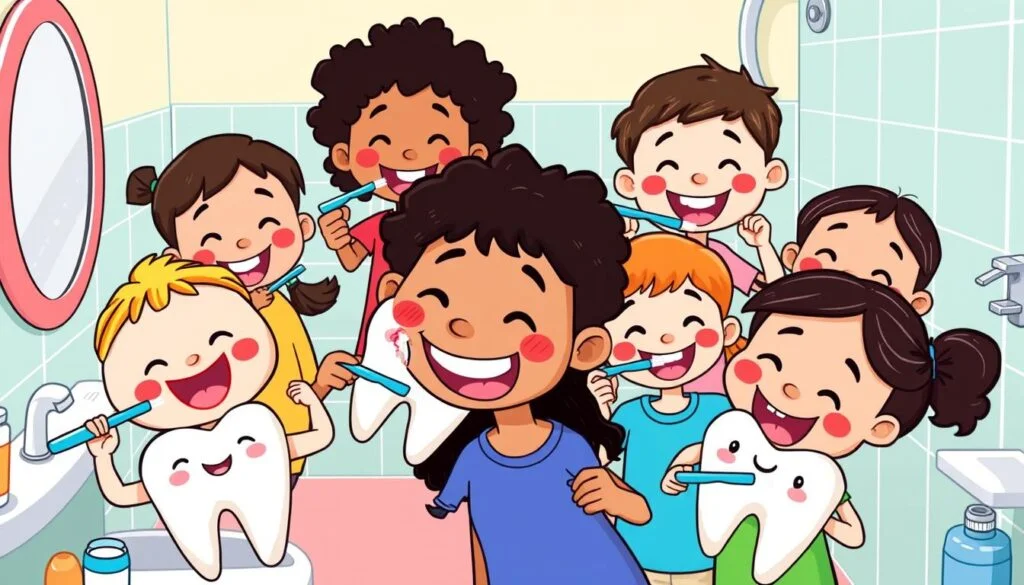When Should Your Child Start Dental Care? Expert Guide
When to Start Dental Care for Your Child: Expert Advice
As parents, we always want the best for our kids, including their oral health. The question of when to take our little ones to the dentist is common. The answer is key to their dental health and growth.
In this guide, we’ll talk about why early dental care is important. We’ll also cover when it’s best for a child’s first dentist visit. By following these expert tips, you can help your child have a healthy smile for life.

Key Takeaways
- Starting dental care early is crucial for lifelong oral health.
- Regular dental visits from a young age can prevent common dental problems and support growth.
- Good dental care helps kids develop healthy habits and a positive view of oral hygiene.
- Choosing the right pediatric dentist is key for a comfortable and fun experience for your child.
- A balanced diet and enough water are important for keeping kids’ teeth and gums healthy.
Understanding the Importance of Early Dental Care
Starting good oral health habits early is key for kids’ long-term health. By focusing on baby tooth care and preventing tooth decay, parents can help their kids have healthy smiles forever.
Long-term Benefits of Starting Dental Care Early
Regular dental visits from a young age help kids see dental care as positive. This builds a strong foundation for good dental hygiene. It also helps catch and fix problems early, avoiding bigger issues later.
Impact on Overall Child Development
Good oral health does more than just keep teeth and gums healthy. It also boosts a child’s physical, social, and emotional growth. Bad oral health can cause pain, eating troubles, and speech issues. These can make it hard for kids to learn, play, and connect with others. Healthy teeth and gums support kids’ overall well-being and help them succeed in life.
Building Healthy Dental Habits
Starting dental care early helps parents teach kids good dental habits. This includes showing them how to brush and floss right, eating a balanced diet, and going to the dentist regularly. These habits are good for their teeth and overall health.
“Early dental care is the foundation for a lifetime of healthy smiles. By prioritizing children’s oral health from a young age, parents can set their kids up for success in all areas of their lives.”
Dental Care for Kids: When Should Your Child Start Going to the Dentist?
Many parents wonder when to take their kids to the pediatric dentist for the first time. The American Academy of Pediatric Dentistry suggests a visit within six months of the first tooth or by their first birthday. This is the earliest time for a dentist visit.
The first visit is a big step in your child’s dental care journey. The pediatric dentist will check your child’s mouth, teeth, and gums. They look for any problems and teach you how to brush your child’s teeth right.
| Recommended Age for First Dentist Visit | Key Benefits |
|---|---|
| Within 6 months of first tooth eruption or by 1st birthday | Early detection of dental issues Establishment of good oral hygiene habits Familiarization with the dentist’s office Promotion of overall child development |
By taking your child to the pediatric dentist early, you’re starting them on the right path. Regular visits help catch problems early and make your child comfortable with the dentist.
Dental care for kids is key for their health and development. So, book that first dentist visit without delay. It’s a vital step for your child’s oral health for life.
Baby’s First Tooth: Essential Care Guidelines
When your child’s first tooth comes in, it’s key to start good baby tooth care habits. This helps avoid tooth decay and supports healthy pediatric dentistry practices. Here, we’ll share the main steps for caring for your baby’s teeth from the start.
Cleaning Baby Gums
Before the first tooth shows up, clean your baby’s gums. Use a soft, damp cloth or a baby gum massager after feedings. This removes milk or food bits.
Managing Teething Discomfort
Teething can be tough for babies and parents. To ease your child’s pain, try a chilled teething ring, gum massage, or pain meds as your pediatrician suggests.
First Tooth Cleaning Techniques
When the first tooth comes in, start cleaning baby teeth. Use a soft-bristled toothbrush and a tiny bit of fluoride-free toothpaste. Brush all tooth surfaces, including the front, back, and top.
- Begin brushing as soon as the first tooth appears, usually around 6 months.
- Choose a soft-bristled toothbrush made for infants and young kids.
- Put a small amount of fluoride-free toothpaste, like a grain of rice.
- Brush all tooth surfaces gently, being careful not to hurt the gums.
Good baby tooth care habits from the start are vital. They help prevent tooth decay and support pediatric dentistry health for life. By following these tips, you’ll make sure your child’s first teeth get the care they need.
Choosing the Right Pediatric Dentist for Your Child
Finding the right pediatric dentist is key for your child’s dental health. Pediatric dentistry focuses on kids’ unique oral care needs. The right dentist can help your child feel comfortable and ensure their teeth grow well.
When picking a pediatric dentist, consider these important factors:
- Specialization in Children’s Dentistry – Choose a dentist with extra training in pediatric dentistry. They should know how to care for kids in a friendly way.
- Office Environment – The dental office should be fun for kids. It should feel welcoming and make your child feel at ease.
- Dentist’s Approach – A great pediatric dentist is good at talking to kids and building trust. This makes dental visits a positive experience.
Choosing the right pediatric dentist is crucial for your child’s children’s oral health. It also shapes their view of pediatric dentistry. A positive first first dentist visit helps start good dental habits for life.
| Factors to Consider | Importance |
|---|---|
| Specialization in Children’s Dentistry | Ensures the dentist is equipped to handle the unique needs and challenges of pediatric patients. |
| Office Environment | A welcoming, child-friendly atmosphere can make the dental visit a positive experience for your child. |
| Dentist’s Approach | A dentist with excellent communication skills and the ability to build trust can make all the difference in how your child views dental care. |

By carefully choosing a pediatric dentist, you’re investing in your child’s children’s oral health. You’re also setting them up for a lifetime of good dental experiences.
Common Dental Issues in Young Children
Children face many dental challenges as they grow. These include early childhood caries, thumb sucking effects, and misaligned teeth. Knowing about these issues helps parents protect their child’s teeth.
Early Childhood Caries
Early childhood caries, or baby bottle tooth decay, is common in young kids. It happens when teeth are exposed to sugary liquids for too long. This can cause pain, infection, and tooth loss if not treated.
Good oral hygiene and limiting sugary drinks are key to preventing tooth decay in kids.
Thumb Sucking Effects
Thumb sucking is common in young children. But, it can harm their teeth if done too much. It can cause teeth to grow in wrong and lead to orthodontic problems.
Parents should try to stop thumb sucking. They can offer pacifiers or other comfort items instead.
Misaligned Teeth Concerns
Misaligned teeth, or malocclusion, can come from many things. This includes genetics, losing teeth too early, or thumb sucking. It can make chewing, speaking, and feeling confident hard.
Seeing an orthodontist regularly is important. It helps catch and fix alignment problems early.
By knowing about these dental issues and acting early, parents can help their kids have healthy teeth. This sets them up for good oral hygiene habits for life.
| Dental Issue | Description | Preventive Measures |
|---|---|---|
| Early Childhood Caries | Tooth decay caused by prolonged exposure to sugary liquids | Maintain good oral hygiene, limit sugary beverages |
| Thumb Sucking Effects | Misaligned teeth and other orthodontic concerns due to prolonged thumb sucking | Discourage thumb sucking, provide alternative comfort methods |
| Misaligned Teeth | Improper tooth alignment that can affect chewing, speech, and self-confidence | Regular orthodontic evaluation and timely intervention |
“Early detection and prevention are the keys to maintaining a healthy smile in young children.”
Preventive Dental Care Measures
Keeping your child’s teeth clean is key for their health. As a parent, you can take steps to protect their teeth and gums. This helps avoid future dental problems.
Teaching your child to brush and floss regularly is crucial. Show them how to brush all teeth surfaces for two minutes, twice a day. Start flossing when their teeth touch, usually by 2-3 years old.
Fluoride treatments are also important for tooth decay prevention. Fluoride makes teeth stronger against acid attacks. Your dentist might suggest fluoride treatments or supplements for your child.
Dental sealants are another great option. These thin coatings are placed on the back teeth to prevent decay. They block bacteria and food from reaching vulnerable areas.
“Preventive dental care measures, such as regular brushing, flossing, fluoride treatments, and dental sealants, can significantly reduce the risk of dental problems in children.”
By making these habits part of your child’s routine, they can keep a healthy smile for years. This boosts their confidence and overall health.

The Role of Diet in Children’s Oral Health
Keeping a balanced diet is key for kids’ teeth health. It helps prevent tooth decay and keeps their teeth strong. Knowing how different foods affect their teeth helps us make better choices for them.
Foods to Avoid
Some foods are bad for kids’ teeth because they’re too sweet or acidic. Avoid sugary treats like candy and cookies. Also, stay away from sticky foods like dried fruit and chips. Acidic drinks, like fruit juices, can wear down tooth enamel.
Tooth-Friendly Snacks
- Fresh fruits and vegetables: Crunchy options like apples, carrots, and celery help clean teeth and stimulate saliva production, which neutralizes acid.
- Cheese and yogurt: These dairy products are rich in calcium and phosphate, which can help strengthen tooth enamel.
- Nuts and seeds: Packed with vitamins and minerals, these snacks can promote healthy teeth and gums.
Importance of Hydration
Drinking enough water is vital for kids’ teeth health. Water helps make saliva, which cleans teeth and fights acid. Encourage kids to drink water instead of sugary drinks for better dental health.
| Tooth-Friendly Foods | Foods to Avoid |
|---|---|
| Apples Carrots Cheese Yogurt Nuts Seeds | Candy Cookies Soda Dried fruit Chips Fruit juices Sports drinks |
By choosing tooth-friendly snacks and making sure kids drink enough water, we help their teeth stay healthy. This supports their children’s oral health, tooth decay prevention, and pediatric dentistry needs.
Conclusion
Early and consistent dental care for kids is very important. Starting dental care early has long-term benefits. It helps ensure your child’s oral health is a priority from a young age.
Teaching healthy dental habits is key. This includes regular check-ups and proper cleaning. These habits are the foundation for a lifetime of good oral health.
In this guide, we’ve talked about how dental care affects a child’s development. We’ve also covered common dental issues and given tips on choosing a pediatric dentist. Diet and hydration are also crucial for kids’ oral health.
As parents, making dental care a priority is an investment in your child’s future. By getting them the right treatment and advice early, you help them have strong teeth and gums. This sets them up for a lifetime of confident smiles.
Remember, dental care for kids and children’s oral health are key for their overall well-being and growth.
FAQ
When should my child start going to the dentist?
The American Academy of Pediatric Dentistry says kids should see a dentist within 6 months of their first tooth. Or by their first birthday. This first visit helps them feel comfortable with the dentist and catches any oral health problems early.
What are the benefits of starting dental care early for my child?
Early dental care is key for your child’s health and growth. It helps prevent tooth decay and ensures teeth and jaws grow right. It also boosts their physical, social, and emotional health.
How should I care for my baby’s first teeth?
Clean your baby’s gums with a damp cloth before their first tooth. When the tooth comes in, use a soft toothbrush and fluoride-free toothpaste. Stay away from sugary foods and drinks to avoid tooth decay.
What should I look for when choosing a pediatric dentist for my child?
Look for a pediatric dentist who specializes in kids’ dentistry. The office should be welcoming, and the dentist should be great with kids. Make sure they’re covered by your insurance too.
What are common dental issues that can affect young children?
Young kids often face tooth decay, thumb sucking effects, and misaligned teeth. Catching these problems early can stop bigger issues later.
How can I prevent dental problems in my child?
Brush and floss your child’s teeth well, and use fluoride and dental sealants. A healthy diet and staying hydrated also help keep their teeth strong.






Post Comment